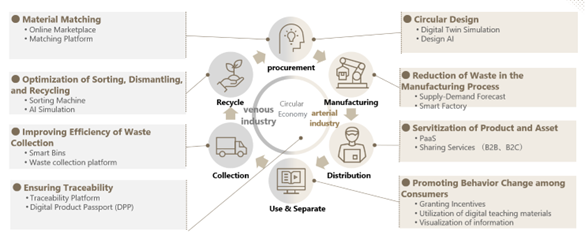Sep 10, 2024
ABeam Consulting highlights key aspects to thrive in the circular economy
ABeam Consulting shares insights that show the increasing importance of circular economy on the global scale.
(Bangkok, Thailand) The industrial revolution and technological advancements have undoubtedly brought economic growth and prosperity, but they have also exacted a heavy toll on our planet, which is our only home. The adverse effects of progress, such as pollution, waste, and resource depletion, have become impossible to ignore. The global call for a transition to a circular economy is growing louder, prompting us to rethink our systems and cease the constant disposal of goods.
In a circular economy, as defined by the Ellen MacArthur Foundation, products and materials are continuously reused and recycled through processes like maintenance, refurbishment, remanufacturing, recycling, and composting. This new approach eliminates the concept of 'waste' as we once knew it.
Businesses worldwide are seizing the opportunities presented by the shift towards a circular economy, especially with the assistance of digital technology. One critical element in achieving circularity is the traceability of materials, which enables manufacturers to ensure the quality of their goods and services, makes the entire product lifecycle visible to consumers, and encourages changes in consumer behavior towards more sustainable practices. The adoption of digital technologies, including AI, blockchain, and online platforms, is rapidly gaining momentum within the framework of a circular economy.”
A helpful way to illustrate the roles that companies play in the economy is through the Japanese metaphor of 'arterial' versus 'venous' industries. Analogous to the arteries in the human body, arterial industries encompass activities related to 'taking' and 'making,' such as car manufacturers and raw materials suppliers. In contrast, venous industries, like used car dealers and recycling facilities, can be likened to veins as they collect, process, and add value to items that would otherwise have become waste through consumption. Thus, to promote circularity, it is crucial for both arterial and venous sectors to strengthen their collaboration and connectivity. This will enable the establishment and robust monitoring of traceability in the circular economy.

Achieving the collective vision of a circular economy hinges on a fundamental shift in consumer attitudes and behaviors, particularly in the responsible sorting and disposal of waste. Moreover, consumer engagement is pivotal in raising awareness about environmental issues and promoting ethical consumption practices, which can have a positive impact on both society and the environment.
The strong commitment to the circular economy presents a fresh opportunity for businesses looking to embrace sustainability. However, it's crucial to recognize that failing to establish the necessary capabilities to meet these new regulations will result in exclusion from the European market. To navigate this shift successfully, manufacturing companies should consider specific steps, primarily emphasizing two key areas: traceability and influencing consumer behavior. Not only will adopting these best practices ensure compliance with forthcoming regulations, but it will also position companies to thrive in a future dominated by greener technologies on a global scale.
One effective way to begin your preparation is by visualizing the essential data requirements. When compiling circularity data requirements, we consider various business needs. These encompass engaging in dialogues with stakeholders, ensuring compliance with disclosure regulations, highlighting the value proposition for consumers, and gaining competitive advantages. Additionally, we factor in data from the entire supply chain, product and service considerations, and the timeframe for data collection. Maintaining data consistency and accuracy is also paramount in this process.
A multi-faceted approach is necessary to leverage circularity data effectively. This entails the development of a comprehensive platform, fostering stronger collaboration with supply chain partners, ensuring data transparency and accuracy, and streamlining data processing through automation.
The process can be broken down into key steps, starting from carefully outlining data requirements. Data collection can then follow, along with addressing any issues encountered. The data may be gathered across subsidiaries and companies located in multiple countries, resulting in a substantial volume of data collected. It is worth noting that the scarcity of data and the disparity between data collected and on-the-ground observations pose significant challenges at this stage.
Beyond identifying and collecting data, data maintenance is crucial. This involves ensuring the compatibility of data from different sources among supply chain partners and establishing parameters for necessary interconnections to promote data sharing between companies. Platform building will then enable advanced data utilization, which includes establishing robust business processes, creating comprehensive manuals, securing expertise in data analysis, and optimizing human resources. Moreover, companies need to remain responsive to evolving demands, opportunities, and threats by keeping data up to date.
The collective efforts aimed at fostering a circular economy offer an exciting opportunity to have a positive impact on the economy, the environment, and people's quality of life. However, in the short term, many companies may find it challenging to build the capacity needed to realize this potential fully. ABeam Consulting possesses a wealth of expertise and experience in system construction, digital technology, and data utilization, making us well-equipped to support companies in their pursuit of circular economy goals.
About ABeam Consulting (Thailand) Ltd.
ABeam Consulting (Thailand) Ltd. is a subsidiary of ABeam Consulting Ltd. – headquartered in Tokyo having 8,300 people serve clients throughout Asia, the Americas, and Europe providing consulting services in Thailand since 2005, ABeam Consulting (Thailand) has more than 450 professionals serving clients in Thailand with expertise in business and digital transformation services that create the future together with corporations and other organizations. As a creative partner leading the way reliably through change, we contribute to industrial and societal change.
Please contact us at contactthailand@abeam.com or visit https://www.abeam.com/th/en for more details.
Click here for inquiries and consultations
